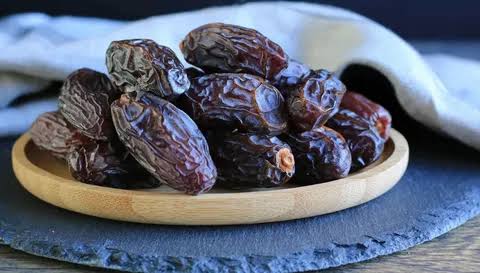Srinagar, March 06, 2025 – As the crescent moon heralded the start of Ramadan ul Mubarak on March 2, 2025, marking the onset of the 1446 Hijri year, Muslims across the globe, including the Kashmir Valley, began their month-long journey of fasting, prayer, and reflection. Unlike the Gregorian calendar’s 365 days, the Islamic lunar calendar spans 355 days, causing Ramadan and other Islamic festivals like Eid ul Fitr and Eid ul Adha to shift approximately 10 days earlier each year. This unique rotation means that next year, Ramadan is expected to commence around February 18, 2026, and over a 36-year cycle, it traverses the entire Gregorian year—a phenomenon that adds a dynamic charm to these celebrations.
In Kashmir, where the holy month holds profound spiritual significance, one humble fruit takes center stage: the date. Known locally as khajoor, dates are more than just a sweet treat; they are a Sunnah of Prophet Muhammad (PBUH), who recommended breaking the fast with them. This tradition resonates deeply in the Valley, where bustling markets like those in Srinagar’s Lal Chowk and downtown areas see a surge in demand for dates as Ramadan approaches. From the affordable Safawi to the prized Ajwa, these fruits are a staple for iftar tables, blending religious reverence with remarkable health benefits.
A Fiber-Rich Superfood
Dates are a nutritional powerhouse, packed with fiber, vitamins, and minerals that offer a host of health advantages. According to the U.S. Department of Agriculture, a single pitted date contains 1.6 grams of fiber—about 6% of the daily recommended intake. This fiber, primarily insoluble, plays a critical role in digestive health. In Kashmir, where dietary habits often include rich, meat-heavy dishes like rogan josh and yakhni, dates provide a natural counterbalance, softening stools, preventing constipation, and promoting a healthy colon. Research published in Critical Reviews in Food Science and Nutrition highlights how this fiber binds to cholesterol and fats, flushing them out of the body and reducing levels of LDL, the “bad” cholesterol linked to heart disease.
A Heart-Healthy Choice
For Kashmiris, where winter diets can be calorie-dense, dates offer a heart-friendly boost. Rich in potassium, they help regulate blood pressure and reduce the risk of stroke and cardiovascular diseases—conditions that health experts note are on the rise in the region due to sedentary lifestyles and stress. Soaking dates overnight and consuming them crushed in the morning, a practice advocated by nutritionists, maximizes these benefits. In a Valley where harsh winters often limit fresh produce, dates—available year-round—are a reliable ally for heart health.
Packed with Essential Nutrients
A 2003 study in the International Journal of Food, Sciences, and Nutrition dubbed dates “an almost ideal food,” citing their wealth of 15 minerals, amino acids, and unsaturated fatty acids. In Kashmir, where osteoporosis and anemia are concerns, particularly among women, dates deliver copper, magnesium, and iron in abundance. Iron-rich varieties like Medjool help combat anemia, a condition affecting many in rural areas, while magnesium supports bone strength and reduces inflammation—a boon for those battling arthritis in the cold climate. Selenium, another key nutrient, bolsters immunity, and Vitamin B6 enhances brain function, offering a natural energy lift during fasting hours.
Popular Varieties in Kashmir
Kashmir’s markets brim with date varieties catering to every palate and budget. The Ajwa date, revered for its religious significance and velvety texture, is a premium choice, often imported from Saudi Arabia. Priced higher, it’s a favorite among those seeking the best for Ramadan. Safawi, with its soft, dark flesh, is widely available and affordable, making it a household staple. Medjool, known as the “king of dates” for its size and sweetness, appeals to those who enjoy a richer taste, while Yellow Barhi, crisp and mildly sweet, offers a lighter option. Vendors in Srinagar’s Batamaloo and Anantnag’s Khanabal markets report brisk sales of these varieties, with *Safawi* and *Ajwa* topping the charts during Ramadan.
Cultural and Culinary Significance
Beyond health, dates weave into Kashmir’s Ramadan fabric. Families blend them into dry fruit mixes with almonds and walnuts—local specialties—or serve them alongside sheer chai at iftar. The fruit’s versatility shines in dishes like date-stuffed naan, a sweet twist on traditional bread. For 22-year-old Amina from Sopore, breaking her fast with dates is “a moment of connection—to faith, family, and health.”
As Ramadan 2025 unfolds, dates remain a timeless symbol of sustenance and spirituality in Kashmir. Whether you’re savoring a plump Medjool or a modest Safawi, this ancient fruit delivers a wealth of goodness—one bite at a time.
Note: Sahil Manzoor Bhatti
Sahil Manzoor Bhatti is a writer exploring the nexus of culture, health, and tradition, with a focus on the nutritional benefits of dates during Ramadan.
Contact: sahilmanzoor0401@gmail.com.




